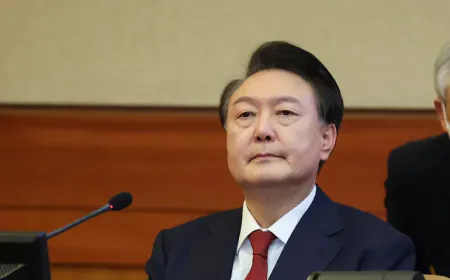Bridging the Global AI Divide for Inclusive Growth
As AI evolves, nations must ensure inclusive growth and fair access. Learn how China and others are shaping global AI development.

Making AI an Inclusive Engine for Global Development
As China’s AI model DeepSeek garners international acclaim, the global spotlight has once again turned to the urgent need for inclusive artificial intelligence (AI) development. The rapid expansion of AI technologies underscores the growing digital divide—a gap that demands strategic global governance, cooperative problem-solving, and inclusive growth to ensure equitable access to its benefits.
Throughout history, every technological revolution has brought both progress and paradox. As Karl Marx once remarked during the Industrial Revolution, “everything seems pregnant with its contrary.” This irony is echoed in today’s AI era, where groundbreaking innovations risk deepening global inequality if left unchecked.
A modern manifestation of this “paradox of wealth” can be seen in the disparities between nations in AI research funding, hardware availability, talent access, and deployment capabilities. While more than $300 billion is spent annually on enhancing global computing power—according to a joint report by the International Labour Organization and a UN technology office—most of this investment is concentrated in high-income countries. As a result, low-income nations and their budding startups face significant disadvantages in both infrastructure and skills development.
To illustrate, Africa accounts for less than 1% of the world’s data center capacity. The International Monetary Fund’s AI Preparedness Index from 2023 paints a stark picture: developed countries scored an average of 0.68, whereas emerging markets and low-income nations scored only 0.46 and 0.32, respectively.
The consequences of this divide are increasingly evident. Experts warn that if left unresolved, AI could become a driver of extreme technological polarization, where a handful of nations dominate innovation and reap its rewards, while developing countries remain relegated to supplying raw data with limited return.
Some national policies are further exacerbating this gap. A number of advanced economies are pursuing strategies to consolidate AI advantages—forming exclusive alliances, imposing tech barriers, and fragmenting global supply chains. This pursuit of dominance fosters a hierarchical AI landscape, marginalizing the participation of developing nations and threatening global cooperation.
Felix Dapare Dakora, former president of the African Academy of Sciences, highlighted the danger of such trends, stating that they steer AI development away from international collaboration and towards fragmentation.
This growing divide reinforces a vital truth: while technology can empower, it does not guarantee inclusion or equity by default. UN Secretary-General António Guterres has emphasized that the world must never allow “AI to stand for advancing inequality.”
To ensure AI serves humanity equitably, the global community must prioritize not just smarter algorithms, but collective wisdom and inclusive governance. Bridging the AI divide requires solidarity, with a commitment to ensuring all nations—regardless of economic status—benefit from technological advancement.
This begins with investments in capacity building, encouraging open exchange of AI tools, expertise, and infrastructure. The true potential of AI lies not in elite technologies, but in generating grassroots innovation and enabling communities across the globe.
Cooperation among countries—whether North-South, South-South, or trilateral—should be strengthened to enhance digital connectivity, improve AI education, and develop local talent. Such efforts would lay the foundation for a more robust and inclusive AI ecosystem.
Further democratization of networks, computing resources, and data is also essential to achieving digital equity. Making AI services more accessible to small and medium-sized enterprises and the broader public through affordable, low-barrier platforms is a vital step forward.
International Telecommunication Union Secretary-General Doreen Bogdan-Martin has called for unified global action to build “safe and inclusive AI accessible to all.”
At the AI Action Summit in Paris, global stakeholders—including France, China, India, the European Union, and numerous international organizations—endorsed the Statement on Inclusive and Sustainable Artificial Intelligence for People and the Planet. This initiative specifically aims to bolster AI capabilities across the Global South.
To counter AI polarization, the global community must reject protectionism and technological segregation. Instead, it should build an open, fair, and collaborative AI environment where equal opportunity, shared rules, and mutual benefit guide development.
This people-centered approach must also address AI’s ethical and security concerns. Key areas such as data protection, algorithmic bias, privacy, and intellectual property rights require international risk assessments and proactive early warning mechanisms.
Despite growing discourse around AI ethics, binding laws and comprehensive treaties are still in early stages. Global consensus is necessary to guide AI’s evolution in alignment with shared human values, while respecting national contexts.
China, recognizing the urgency of bridging the gap, has stepped forward with proactive measures. Through initiatives like the Global AI Governance Initiative and the AI Capacity-Building Action Plan for Good and for All, China has championed equitable AI development. At the 78th United Nations General Assembly, it led the adoption of a resolution supporting international cooperation on AI capacity building.
China has also collaborated with Zambia to co-host the Group of Friends for International Cooperation on AI Capacity-building at the UN Headquarters in New York. Additionally, the launch of the China-Laos AI Innovation Cooperation Center and a precision agriculture partnership with Cambodia exemplify efforts to bring AI-driven benefits directly to developing regions.
These initiatives are tangible efforts to ensure developing nations are not mere observers of the AI revolution, but active participants shaping its trajectory.
Ultimately, the value of technological progress lies in its impact on society. As AI continues to drive the next wave of global industrial transformation, the world must unite—harnessing its potential to confront shared challenges and foster a future where intelligence, both artificial and human, serves all of humanity.
What's Your Reaction?


































